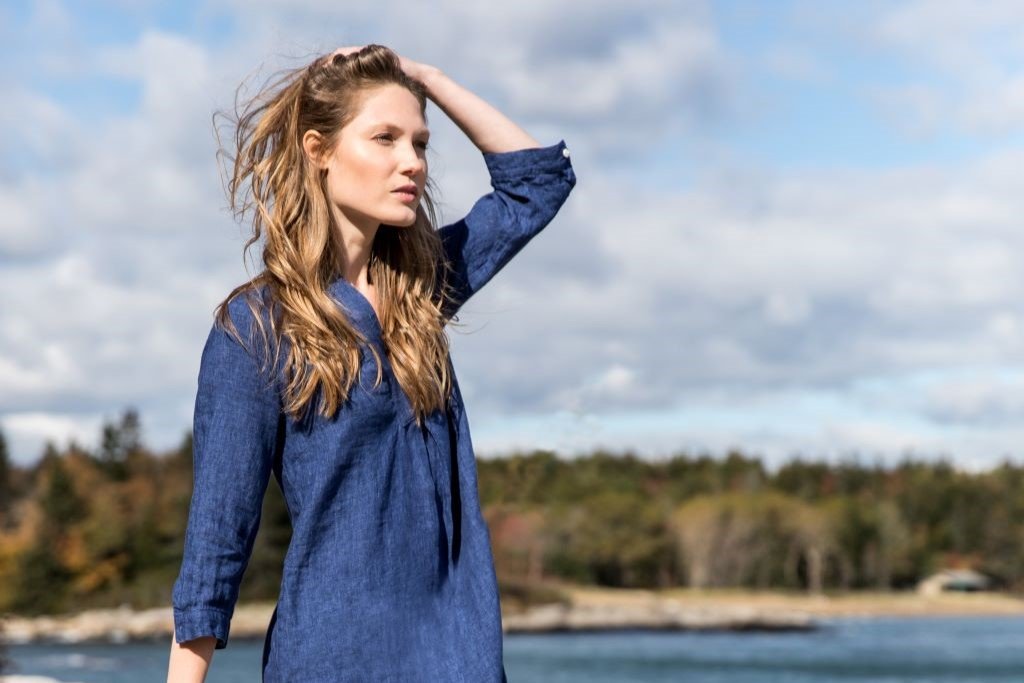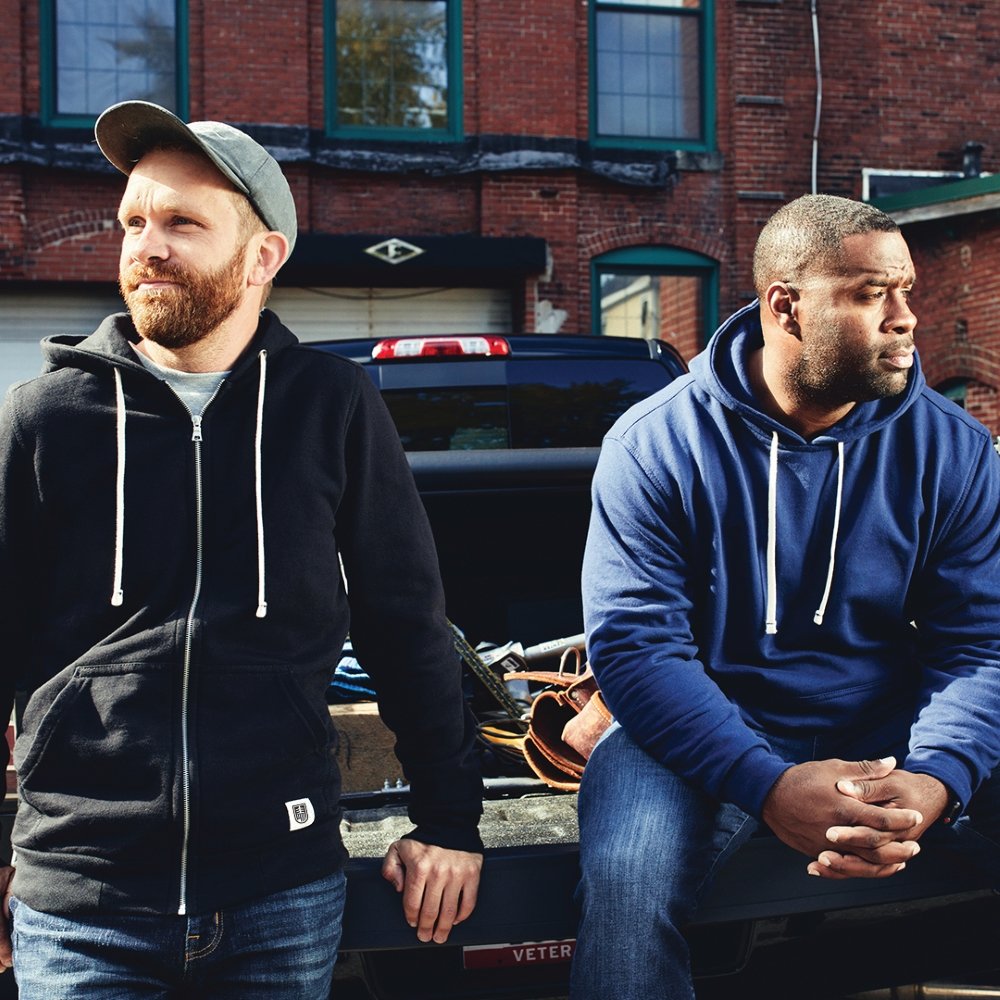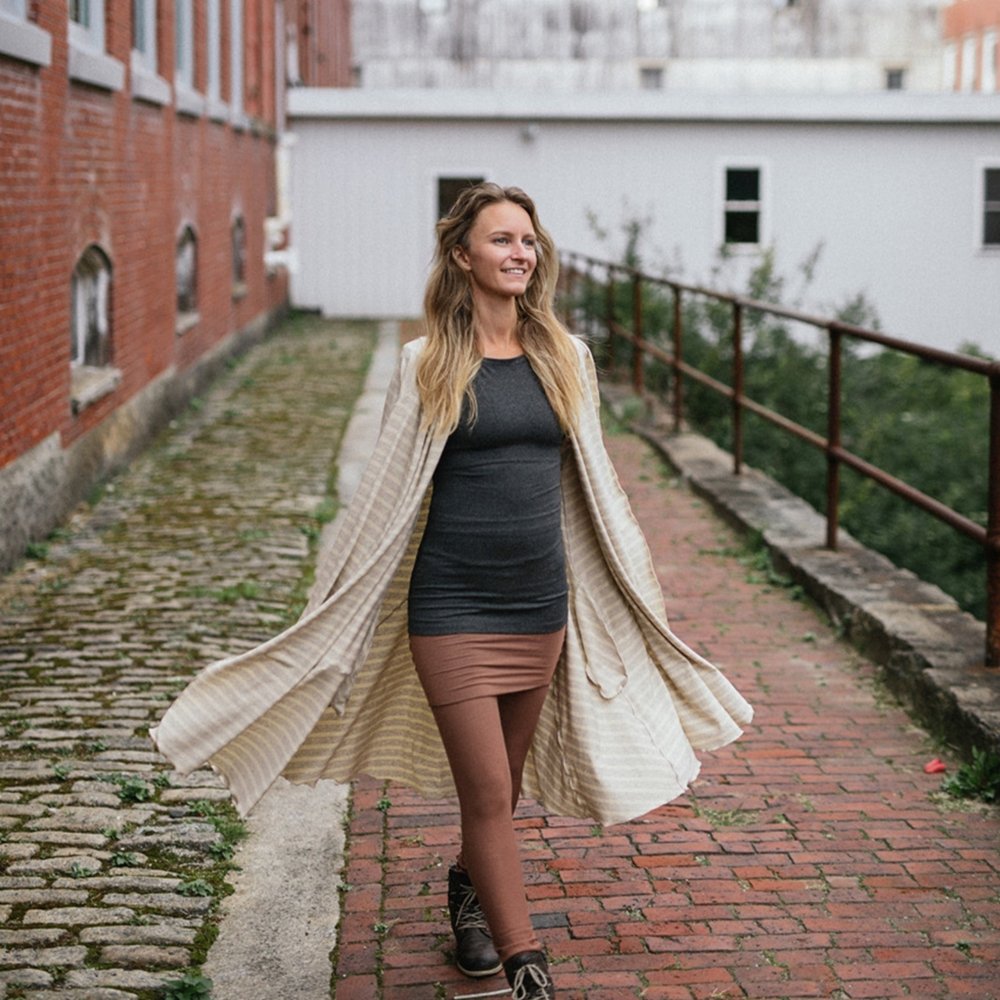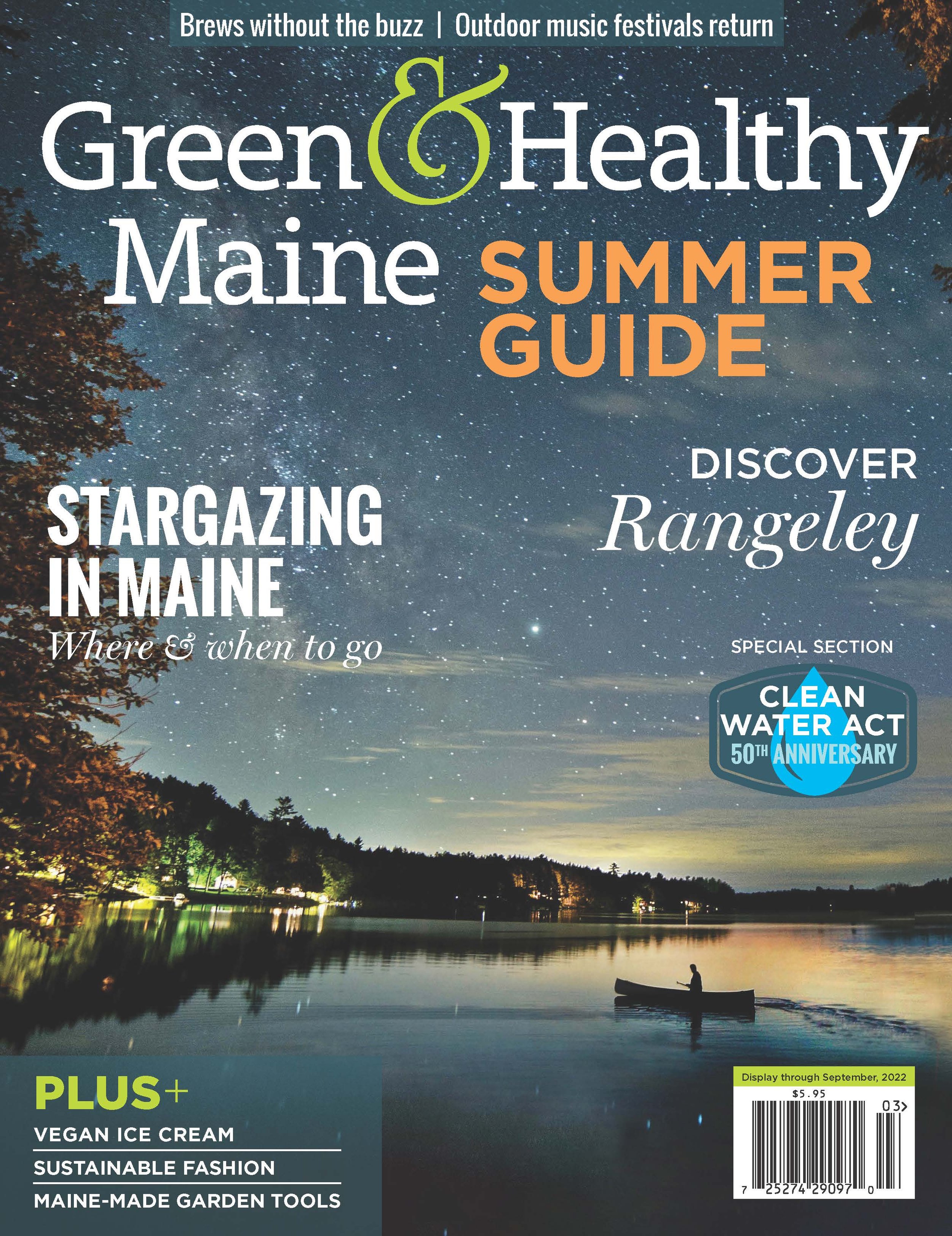Sustainable fashion designed in Maine
The Studio 412 collection by Maine native Beth Bowley features simple, elegant garments in exquisite, natural-fiber fabrics. Photo: Erin Little Photography
By June Donenfeld
Courtesy photos, unless noted
Maine has a long tradition of thoughtful design, skilled craftsmanship and durable products. So it’s no surprise that we should see all of these hallmarks in the work of the apparel and footwear companies based here, many of which put sustainability or social mission—or both—front and center in their businesses. Here’s a roundup of some of the best.
Photo: Michael D. Wilson
American Roots
American Roots is a values-driven Maine manufacturer whose mission is at the heart of all they do. Their sturdy, high-quality, down-to-earth clothing is made by highly trained union labor in Maine, using 100% U.S.-sourced materials. Portland native Ben Waxman co-founded American Roots in 2013 with his wife and partner, Whitney Waxman. Most of the company’s expert stitchers are new Mainers who gained their skills through a remarkable tuition-free school called Common Threads of Maine, founded and led by Ben’s mother, Dory Waxman. She started the nonprofit organization to promote satisfying careers in the Maine textile industry by teaching production sewing, advocating for equitable workplace treatment and helping in business development; nearly all participants have been refugees, asylum seekers or new U.S. citizens. And Dory herself has long experience in starting and running a Maine textile company of her own, Old Port Wool & Textile Company, whose local staff creates warm woolen garments and blankets of U.S. materials in a Portland factory studio.
Photo: Amie Miklovich
Angelrox®
Hand-cut and -stitched in a bright, airy space in a historic textile mill in Biddeford, the stylish and comfortable Angelrox® garments are created by a family business focused on sustainability and giving back to the community. The durable, easy-to-care-for clothing is made of plant-based fibers, each piece created by a single stitcher working on machines invented in New England in the 19th century. The casually elegant styles are mindfully designed to fit a wide range of shapes and sizes and come in subtle, compatible colors. Founder Roxi Suger launched her company in 1999 in New York City and spent years there designing for high-profile fashion names, then moved the entire business to Maine in 2012. Angelrox® minimizes waste in production and saves, reuses, recycles and eliminates waste in their office, too. Their packaging is made of 100% recycled paper, and fabrics are knit in the Northeast to reduce the carbon cost of shipping.
Photo: Paul Schafer
Brook There
Conventional cotton uses more pesticides than any other crop, so Brook DeLorme uses only organic cotton for the minimalist, comfortable, ethically produced, long-lasting undergarments and loungewear she designs and makes the patterns for in her home state of Maine. With nature-inspired colors and an unwavering focus on sustainability, the U.S.-milled yarn is Global Organic Textile Standard (GOTS)-certified and all pieces are cut and sewn by a small team in a historical Massachusetts mill town. The garments stay at the factory until they’re shipped to customers, eliminating the need for poly bag packaging—a standard practice at most warehouses—and cutting down on transportation carbon costs. And to avoid single-use plastic, Brook There uses recycled poly bags and tissue paper when they pack and ship their bras, bottoms and loungewear to happy customers near and far.
Photo: Abby Lank
Kurier
Located in the East End neighborhood of Portland, independent, women-owned Kurier carries a wide range of leather goods and other items—many made in-house—from handbags to headbands, clogs to clothing, hair clips to home goods. All items are made with an eye to sustainability and lasting quality, and they source their materials carefully, often using leather and fabric extras and seconds to ensure there won’t be waste on their watch.
Peace House Studio
This family-owned Bath company makes their vibrant, comfy, durable children’s clothing of organic cotton fabric manufactured with low-impact dyes. Kate Wiebe Bergmann and husband Nick Bergmann founded the company to make quality garments out of earth-friendly materials, but also wanted to extend their functional lives and promote a culture of reuse. With this thought in mind, they created the Patches Project, which features the Patches and Scraps collection, an everchanging array of new irregulars; washed, inspected and repaired returns; and clothing made from scrap fabric. To keep the clothes in circulation and out of landfills, customers can also return any item made by Peace House Studio, after its first or fiftieth wear—or more—for store credit or a cash payout.
Photo: Lyssy Thomas
Catherine Fisher Clothing
As of 2023, Catherine Fisher Clothing has closed.
Catherine Fisher sources only sustainable materials for her Maine-crafted, simple (but never plain) clothing that is perfect for dressing up or down as the occasion demands. Featuring distinctive details that set them apart from more traditional styles, all pieces in her collection comes in five or six sizes and each design is inspired by a poem Fisher herself has written. And her commitment to ethics and the environment doesn’t stop at the clothes themselves: even the hangtags and stationery use planet-friendly materials and processes. Fisher also believes in giving back through her business: 10% of each sale goes to local and national charities. You can see her pieces in person at her welcoming, light-filled studio in Fort Andross in Brunswick, where she hand paints decorative accents directly onto the fabric of some of her garments.
Jax & Bard
With slow fashion as their watchword, Jax & Bard in Cumberland County has reinvented classic clogs, combining traditional wooden bottoms with modern technology and materials to create eye-catching, versatile footwear that is as suited to errand-running as it is for a night on the town. Assembled by hand in Maine, the shoes have soles made of Forest Stewardship Council (FSC)-certified wood remnants and uppers made from environmentally friendly textiles. The company is 100% woman-owned and -operated by a 20+ year veteran of the U.S. shoe industry, Jackie “Jax” Lindstadt.
Photo: Erin Little Photography
Studio 412
In fourTWELVE, her jewel box of a boutique on Main Street in Rockland on the Midcoast, Maine native Beth Bowley offers her own line of timeless women’s clothes, along with other high-end women’s clothing, accessories and decorative home goods. Her Studio 412 collection launched in 2010 and features simple, elegant garments in exquisite, natural-fiber fabrics, with linen a favorite. Also sold nationally, the garments are designed by Bowley and crafted meticulously onsite by a small, devoted team that’s been there for years. After training at Parsons School of Design in New York City, Bowley worked there as a highly successful designer for many years, but eventually heard Maine’s siren call and opened her shop in 2007. One thing that hasn’t changed? Her love of creating garments that suit their wearers to a T.
Rogue Industries
Rogue Industries got its start in 2007 with an ingenious (patented!) design for a front-pocket wallet that really took off. Since then, they’ve added piece after piece to their lineup, and though they sell their stylish, hardwearing leather goods across the country, everything is designed and crafted in Standish in Cumberland County. Dedicated to sustainability and social responsibility, they meet 100% of their office and workshop energy needs with solar power and are committed to sourcing their leathers responsibly, including American bison from the American West, moose from Canada and salmon from Iceland. They also choose their overseas partners based on their commitment to environmental practices, fair labor standards and fair wages, and work only with those audited and top-rated by the leading monitor of social performance in global supply chains, amfori BSCI. Rogue Industries also walks the talk by supporting nonprofits near and far, from a Maine regional land trust to Médecins Sans Frontières (Doctors Without Borders).
Two Little Beans & Co.
Home-birthed in in 2015 in Kristina Grabarz’s home state of Maine, Two Little Beans outfits babies and toddlers head to toe, from beanies to booties and everything in between. Grabarz sews all her adorable, long-wearing, mix-and-match items in her own studio, using fabric whose prints are influenced by the Maine coast and range from bright and cheery designs to quieter colors and patterns.














This photo of the Milky Way above Oak Pond in Skowhegan, Maine was shot by John Meader of Fairfield, Maine in 2019.